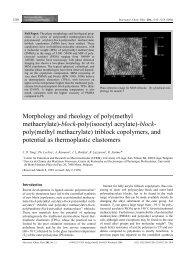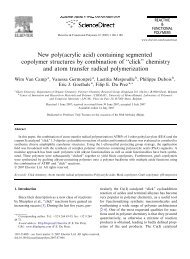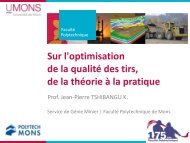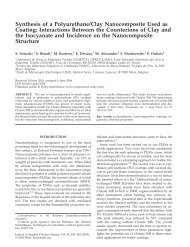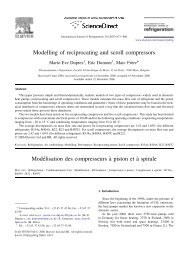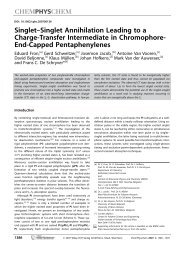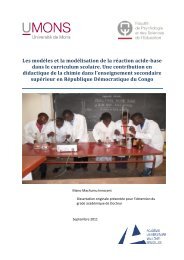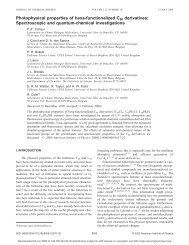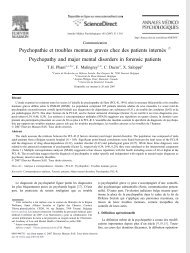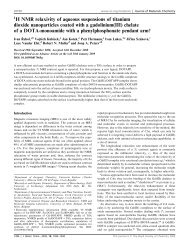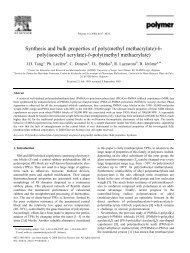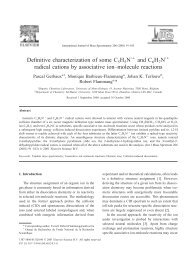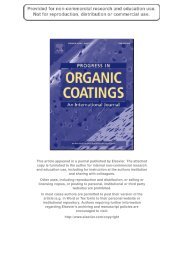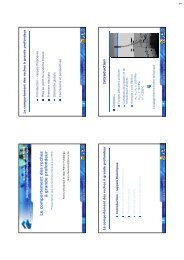Les modèles et la modélisation de la réaction acide-base dans le ...
Les modèles et la modélisation de la réaction acide-base dans le ...
Les modèles et la modélisation de la réaction acide-base dans le ...
Create successful ePaper yourself
Turn your PDF publications into a flip-book with our unique Google optimized e-Paper software.
Annexe 2. Principa<strong>le</strong>s conceptions <strong>de</strong>s élèves sur <strong>la</strong> réaction chimique (artic<strong>le</strong><br />
soumis)<br />
Chemical Reaction and Stu<strong>de</strong>nts' Everyday Life Situations<br />
Innocent Mano Machumu, Institut Supérieur Pédagogique <strong>de</strong> Bukavu, République Démocratique<br />
du Congo and Université <strong>de</strong> Mons, P<strong>la</strong>ce du Parc 20, 7000 Mons Belgique<br />
Didier Vil<strong>le</strong>rs, Université <strong>de</strong> Mons, P<strong>la</strong>ce du Parc 20, 7000 Mons, Belgique<br />
Abstract<br />
In or<strong>de</strong>r to <strong>de</strong>velop successful teaching of the transformations of matter we need to<br />
<strong>le</strong>arn more about wh<strong>et</strong>her stu<strong>de</strong>nts correctly i<strong>de</strong>ntify chemical and physical<br />
processes in or<strong>de</strong>r to comprehend chemical reaction (CR) by giving a vari<strong>et</strong>y of<br />
slightly different interpr<strong>et</strong>ations. We col<strong>le</strong>cted data from a questionnaire submitted<br />
to 240 Congo<strong>le</strong>se second-year chemistry stu<strong>de</strong>nts. The questions can be categorised<br />
in two distinctive groups: (i) questions about school know<strong>le</strong>dge and (ii) questions<br />
about everyday life situations. This paper argues that stu<strong>de</strong>nts’ un<strong>de</strong>rstanding of<br />
chemical reaction is very poor even amongst those who have good know<strong>le</strong>dge about<br />
chemical phenomena. Stu<strong>de</strong>nts’ misconceptions about chemical reaction are<br />
exp<strong>la</strong>ined by difficulties in un<strong>de</strong>rstanding concepts such as phenomena, reactions<br />
and in distinguishing b<strong>et</strong>ween physical and chemical phenomena. Like Greek and<br />
French stu<strong>de</strong>nts, Congo<strong>le</strong>se stu<strong>de</strong>nts show a poor un<strong>de</strong>rstanding of chemical<br />
phenomena and confuse chemical and physical phenomena in everyday life<br />
situations. The survey reveals that most of them know more about physical natural<br />
phenomena than chemical phenomena. Stu<strong>de</strong>nts c<strong>la</strong>ssify reactions into chemical,<br />
physical and biological. They prefer literal meaning of the term “reaction” instead of<br />
its chemical meaning; a proof that they don’t know the real meaning of chemical<br />
reaction. It would be necessary to reform the chemistry curriculum on chemical<br />
phenomena and reaction<br />
Key words: chemical reaction, chemical phenomena, natural phenomena,<br />
misconception, transfer<br />
1. Introduction<br />
In this study we wanted to <strong>le</strong>arn more about wh<strong>et</strong>her stu<strong>de</strong>nts correctly i<strong>de</strong>ntify<br />
chemical and physical processes in or<strong>de</strong>r to comprehend chemical reaction (CR) by<br />
12



